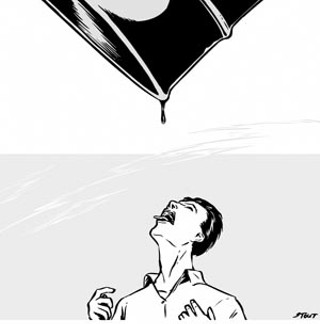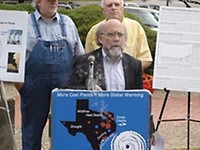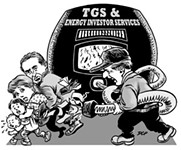Letters at 3AM
$4 a gallon
By Michael Ventura, Fri., April 29, 2005

America is over. America is like Wile E. Coyote after he's run out a few paces past the edge of the cliff – he'll take a few more steps in midair before he looks down. Then, when he sees that there's nothing under him, he'll fall. Many Americans suspect that they're running on thin air, but they haven't looked down yet. When they do ...
Former Federal Reserve Board Chairman Paul Volcker, a pillar of the Establishment with access to economic information beyond our reach, wrote recently: "Circumstances seem to me as dangerous and intractable as any I can remember. ... What really concerns me is that there seems to be so little willingness or capacity to do anything about it" (quoted in The Economist, April 16, p.12). Volcker chooses words carefully: "dangerous and intractable," "willingness or capacity." He's saying: The situation is probably beyond our powers to remedy.
Gas prices can only go up. Oil production is at or near peak capacity. The U.S. must compete for oil with China, the fastest-growing colossus in history. But the U.S. also must borrow $2 billion a day to remain solvent, nearly half of that from China and her neighbors, while they supply most of our manufacturing ("Benson's Economic and Market Trends," quoted in Asia Times Online) – so we have no cards to play with China, even militarily. (You can't war with the bankers who finance your army and the factories that supply your stores.) China now determines oil demand, and the U.S. has no long-term way to influence prices. That means $4 a gallon by next spring, and rising – $5, then $6, probably $10 by 2010 or thereabouts. Their economy can afford it; ours can't. We may hobble along with more or less the same way of life for the next dollar or so of hikes, but at around $4 America changes. Drastically.
The "exburbs" and the rural poor will feel it first and hardest. Exburbians moved to the farthest reaches of suburbia for cheap real estate, willing to drive at least an hour each way to work. Many live marginally now. What happens when their commute becomes prohibitively expensive, just as interest rates and inflation rise, while their property values plummet? Urban real estate will go up, so they won't be able to live near their jobs – and there's nowhere else to go. In addition, thanks to Congress' recent shameless activity, bankruptcy is no longer an option for many. What happens to these people? Exburb refugees. A modern Dust Bowl.
For the rural poor it's even worse. They are the poorest among us, with no assets and few skills; they earn the lowest nonimmigrant wages in America, and they must drive. When gas hits $4, their already below-the-margin life will be unsustainable. They'll have no choice but to be refugees and join in the modern Dust Bowl migration. So, too, will people who live where people were never intended to live in such numbers – places like Phoenix and Vegas, unlivable without air conditioning and water transport (energy prices will rise across the board, regular brownouts, blackouts, and faucet-drips will be "the new normal" everywhere). In the desert cities, real estate will plunge, thousands will be ruined, most will leave – while all over the country folks will have to get used to "hot" and "cold" again.
But where will the new refugees go, and what will they do when they get there? They will migrate to the more livable cities, where rents are already unreasonable and social services are already strained, and where the new refugees will compete with immigrants for the lowest-level housing and jobs. Immigration issues will intensify to hysteria. Native-born Americans will clamor for work that only legal and illegal aliens do now. In a culture as prone to violence as ours, that will probably get ugly.
Meanwhile, suburbs and cities will be in various states of chaos, depending on their infrastructure. As inflation and interest rates rise, and the real estate bubble bursts, millions will see their assets plunge precipitously. In five years, many who are now well-off will live as the marginal live today, while the marginal will sink into poverty. With gas at $4-plus a gallon, real estate values will depend on nearness to working centers and access to transportation. As has already happened in Manhattan, the well-off will head for what are now slums, and the slum-dwellers will go God-knows-where. Places with decent rail service will be prime. Places without rail service will be in deep trouble.
One key to America's future will be: How quickly can we build or rebuild heavy and light rail? And where will we get the money to do it? Railroads are the cheapest transport, the easiest to sustain, and the only solution to a post-automobile America. (For reasons I haven't space to detail, hybrid cars and alternative energy won't cut it, if by "cut it" one means retaining anything like the present standard of living. See James Howard Kunstler's "The Long Emergency" on Rolling Stone's Web site. Also check Mike Ruppert's site www.fromthewilderness.com and the documentary The End of Suburbia.) A massive investment in railroad infrastructure could offer jobs to the unskilled and skilled alike, absorb much of the inevitable population displacement, and create a new social equilibrium 10 or 15 years down the line. Old RR cities like Grand Junction, Colo.; Amarillo, Texas; and Albuquerque, N.M., could become vital centers, offering new lives for the displaced. Railroads are key, but the question is: how to finance them?
There's only one section of our economy that has that kind of money: the military budget. The U.S. now spends more on its military than all other nations combined. A sane transit to a post-automobile America will require a massive shift from military to infrastructure spending. That shift would be supported by our bankers in China and Europe (that is, they would continue to finance our debt) because it's in their interests that we regain economic viability. What's not in their interests is that we remain a military superpower.
And that's where things get really interesting. The question becomes:
Can America face reality? If the government responds to the coming changes by attempting to remain a superpower no matter what, there is no way to underestimate the harm. The numbers speak for themselves. Soon we'll no longer have the resources to remain a military superpower and sustain a livable society that is anything like what we know today. It happened to England; it happened to Russia; it's about to happen to us. England sustained the transformation more or less gracefully; it lost its dominance while retaining its essential character. Russia is still in a period of transformation, but has remained a player thanks to its oil reserves. Europe in general – France, Germany, Italy, and Spain (all world powers in the fairly recent past) – is creating a post-national society, the most experimental form of governance since America's revolution. We have no appreciable oil, and we no longer have a manufacturing base. So what will the United States do? Sanely recognize its declining status and act accordingly, or make one last ignoble stab to retain its position by force?
Half a century ago James Baldwin wrote: "Confronted with the impossibility of remaining faithful to one's beliefs, and the equal impossibility of becoming free of them, one can be driven to the most inhuman excesses." Americans believe they're "No. 1," destined to lead the world. That is the America that's over. If we insist on that illusion, then this world is in for tough times. We will neither hold on to what we have nor create what we might have, but we will wreak untold harm (if we don't destroy the species altogether). Or we can face and embrace reality. And that reality is: There is no such thing as "No. 1" ... there is no such thing as an ideal destined country that is better than any other ... there is only us, doing the best we can, trying to live free and sanely, within limits that are about to become only too clear. Our glory days are done. What's next?
Remember, we're not talking about the far future. We're talking about the next decade.
No country gets two centuries anymore. The 21st will be China's century. That's what $4-plus a gallon means, and nothing can stop it. So: How will we change? But the question "How will we change?" is really the question "How will I change?" Because history isn't a spectator sport. It's you and me. Everything depends on whether we side with reality or illusion. Face reality, and we have a chance. Cling to illusion, and we are lost. The America we've known is over – very soon. The America we can create is up to us. ![]()
Michael Ventura will join Robert Bly, Joseph Chilton Pearce, Coleman Barks, and John Densmore, among others, at Bly's 31st annual Conference on the Great Mother and the New Father, May 28-June 5, in Wisconsin. For info e-mail greatmother@yelllowmoon.com or call 617/332-3541.










